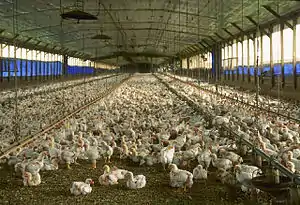Portal:Agriculture/Selected article/18
Factory farming is a term referring to the process of raising livestock in confinement at high stocking density, where a farm operates as a factory — a practice typical in industrial farming by agribusinesses. The main product of this industry is meat, milk and eggs for human consumption. However, there have been issues regarding whether factory farming is sustainable and ethical.

Confinement at high stocking density is one part of a systematic effort to produce the highest output at the lowest cost by relying on economies of scale, modern machinery, biotechnology, and global trade. Confinement at high stocking density requires antibiotics and pesticides to mitigate the spread of disease and pestilence exacerbated by these crowded living conditions. In addition, antibiotics are used to stimulate livestock growth by killing intestinal bacteria. There are differences in the way factory farming techniques are practiced around the world. There is a continuing debate over the benefits and risks of factory farming. The issues include the efficiency of food production; animal welfare; whether it is essential for feeding the growing global human population; the environmental impact and the health risks.
The large concentration of animals, animal waste, and the potential for dead animals in a small space poses ethical issues. It is recognized that some techniques used to sustain intensive agriculture can be cruel to animals. As awareness of the problems of intensive techniques has grown, there have been some efforts by governments and industry to remove inappropriate techniques. (Full article...)